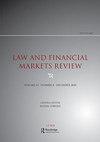授权加密货币交易所作为支付机构的阴暗面
IF 0.9
Q2 Social Sciences
引用次数: 6
摘要
加密货币的最终目标是成为替代、补充或与传统支付系统竞争的支付系统。不管这样的目标是否可以实现,某些加密货币和法定货币之间的功能相似性已经说服了某些欧盟成员国的主管当局向加密货币交易所授予支付机构许可证。乍一看,授予这样的授权似乎是向前迈出的一步,因为它将把原本不受监管的加密货币交易所纳入现有支付监管框架的范围。然而,该授权有效地将支付法律应用于依赖于具有概率终局性的不稳定结算资产的新支付基础设施。由于现有支付法律无法完全解决波动性和最终风险,因此另一种政策选择是向加密货币业务颁发特别许可证或引入围栏机制,以保护传统支付系统免受加密货币支付风险的影响。本文章由计算机程序翻译,如有差异,请以英文原文为准。
The dark side of licensing cryptocurrency exchanges as payment institutions
The ultimate objective of cryptocurrencies is to become a payment system substituting, complementing, or competing with the conventional payment systems. Irrespective of whether such an objective could be accomplished, the functional similarities between certain cryptocurrencies and fiat money has persuaded competent authorities of certain EU Member States to grant payment institution licenses to cryptocurrency exchanges. At first blush, granting such an authorization would seem to be a step forward as it would bring otherwise unregulated cryptocurrency exchanges within the scope of the existing payment regulatory framework. However, this authorization effectively applies payment laws to new payment infrastructures that rely on volatile settlement assets with probabilistic finality. Since the volatility and finality risks cannot be fully addressed under the existing payment laws, an alternative policy option would be granting a special license to cryptocurrency businesses or introducing ring-fencing mechanisms to protect the conventional payment systems from the risks of cryptocurrency payments.
求助全文
通过发布文献求助,成功后即可免费获取论文全文。
去求助
来源期刊
CiteScore
1.40
自引率
0.00%
发文量
0
期刊介绍:
The Law and Financial Markets Review is a new, independent, English language journal devoted to providing high quality information, comment and analysis for lawyers specialising in banking and financial market issues and to others with interests in legal and regulatory developments affecting the financial markets. Published four times a year LFMR contains articles written by leading experts providing a forum for practical guidance on, as well as reflective and topical analysis of, all major jurisdictions, with a particular focus on the interaction between the law and market practice and behaviour.

 求助内容:
求助内容: 应助结果提醒方式:
应助结果提醒方式:


